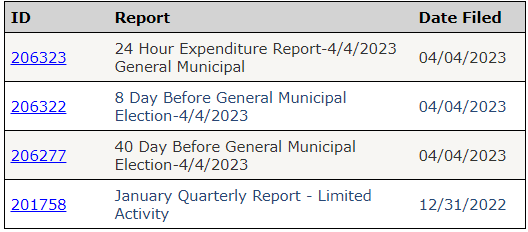In political campaigns, a candidate’s financial reports are often of great interest to their opponents, who look for controversial donations that could make voters suspicious of a candidate. In my own report, there were large donations from the two owners of an apartment complex, which had suffered a great deal of financial loss due to the city’s failure to do their job. Their hope was that better leadership would lead to an improvement in the city services which presently are substandard.
Of course, we also scrutinized the reports of Mayor Jones. They are full of small donations from controversial people, from a former Berkeley mayor whose charges of election fraud were recently dismissed in exchange for an agreement to never again seek office, to a laundry list of members of the Unity PAC, the political operation of Elbert Walton Jr. But her largest donor, Civil PAC, was a complete mystery.
According to the filings of Jones, Civil PAC first contributed to her campaign on January 30, giving her a check for $2,000. Her records then show a contribution of $1,800 on March 8, for a total of $3,800. Ordinarily, an interested voter could look at the PAC’s reports to see where the money is coming from. But Civil PAC didn’t file any reports until election day, so there was no way for voters to determine the real source of the contributions until it was too late. The dates and amounts ultimately reported by Civil PAC also do not exactly match what was disclosed by Jones.
Filtering contributions through a PAC that doesn’t file the required reports is a well crafted abuse of our campaign finance system. And it turns out that Civil PAC has done this before. In 2021, Civil PAC signed a joint stipulation – the Ethics Commission version of a guilty plea – agreeing that they had violated the same disclosure law. In that case, they spent more than $17,000 on flyers opposing a candidate, and failed to disclose that until after the election. More than 1/4 of Jones’ contributions were filtered through Civil PAC.

So where did the money come from? There was a $500 contribution from AMS Market, owner of the USA Market on Chambers which has been the site of a great deal of crime; $1,000 from Sam’s Meat Market, a similar store on West Florissant; $1,000 from Ali Chaudhry, a businessman from Des Peres who once owned the troubled Sabbath Manor nursing home in Normandy, now a vacant lot owned by the city of Normandy, and who owns the Arbor Hills Nursing Home on Chambers at Hartnett; $2,000 from FP1 S. Florissant LLC, the shell corporation which owns the Greenlight Dispensary in downtown Ferguson; and $500 from BG Insurance Agency, a storefront which recently opened in the little strip mall on the corner of the Schnuck’s lot.
The USA Market, located at 1212 Chambers Road, is part of a strip center owned by UU Investments LLC. That building is three years tax delinquent, owing a total of $53,487. The LLC was administratively dissolved in 2019 for lack of a registered agent, meaning it is more difficult to get legal service if there are code violations or other issues. In 2021, when the Metropolitan Sewer District sued for unpaid bills, they attempted to serve the dissolved corporation and Mohamed Ahmed Abdulla, presumably the owner of the LLC. The mailing address on tax records for the property, and on the lawsuit, is an apartment in Chesterfield. Personal property tax records indicate the apartment is occupied by an Isaac Appiah. The registered agent for the liquor store is Mahesh Patel, who appears to have worked in the CPA office of Rajesh Vora. A call to that office reached a phone menu which did not include Vora as an option.
Of course, Mayor Jones can’t control whether the PACs which contribute to her are filing the required disclosures. But this PAC is not acting independently. There’s no way that a PAC in north city, which has never had any involvement in Ferguson, was suddenly the recipient of contributions from several Ferguson businesses, and then spontaneously decided to support Mayor Jones. This was an effort to obfuscate the source of contributions, and to launder corporate money which could not be given directly to a candidate committee.
